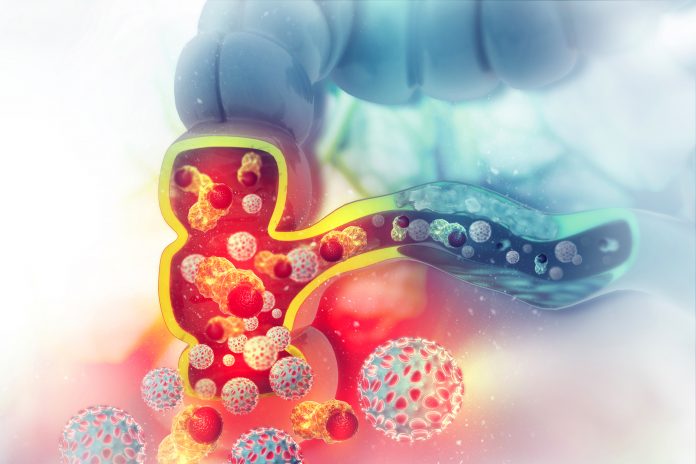
[ad_1]

New analysis has linked important variations within the intestine microbiome to pre-cancerous colonic lesions, in line with findings introduced at UEG Week 2023. The information factors to methods of detecting and treating colon cancer.
The large-scale potential research, involving 8,208 members, used information from the Dutch Microbiome Project with the Dutch nationwide pathology database to establish all recorded instances in that nation of colonic biopsies from the final 5 many years.
Researchers analyzed the operate and composition of the intestine microbiomes of people who developed pre-cancerous colorectal lesions earlier than fecal sampling between 2000 and 2015 (n=214), in addition to those that developed lesions after fecal sampling between 2015 and 2022 (n=305). These teams have been then in contrast with people with regular colonoscopy findings (n=202) and the final inhabitants. The researchers additionally examined particular bacterial strains and their features throughout the intestine by reconstructing their genomes from metagenomic information.
“We sampled all participants once (in ~2015) and then looked at when the participants developed polyps or CRC in relation to the time of sampling,” Ranko Gacesa, PhD tells Inside Precision Medicine. Gacesa is from the University Medical Center Groningen and the research’s lead writer.
Individuals who developed colonic lesions after fecal sampling exhibited elevated variety of their intestine microbiome in contrast with those that didn’t develop lesions. Moreover, the composition and performance of the microbiome differed amongst people with pre-existing or future lesions and various primarily based on the kind of lesion.
Notably, bacterial species from the household of Lachnospiraceae and the genera Roseburia and Eubacterium have been linked with the long run growth of lesions.
“Bacteria genera Roseburia and Eubacterium and some members of family Lachospiraceae bacteria are known to break down fiber and produce short-chain fatty acids (most well-known for being butyrate) which are considered to be beneficial to gut health,” Gacesa says. “While they are often considered to be protective against colorectal cancer, studies are mixed on some of these bacteria. For example, some Eubacteria—such as E. rectalis were also found to be increased in cancer samples.”
Gacesa, provides, “While we didn’t investigate mechanisms in this study, it is known from previous research that some of the bacterial species identified may have properties that could contribute to the development of colorectal lesions. A bacterium called Bacteroides fragilis, for example, is known to produce a toxin that can lead to chronic low-grade inflammation in the gut. Prolonged inflammation is believed to be potentially genotoxic and carcinogenic, meaning it may cause genetic damage and promote cancer.”
Colorectal most cancers is the second most prevalent most cancers and second main reason for cancer-related dying. It usually develops from pre-cancerous lesions throughout the intestine, making the elimination of those lesions an efficient technique for stopping colorectal most cancers. However, present non-invasive detection strategies, such because the fecal immunochemical take a look at, produce a excessive variety of false positives, resulting in pointless colonoscopies.
“The connection between the gut microbiome and pre-cancerous lesions has been underexplored, leaving uncertainty about whether gut bacteria can predict the future onset of colorectal cancer. Our findings suggest that the microbiome could act as a valuable tool to improve existing tests, advancing early detection methods for pre-cancerous lesions and colorectal cancer,” Gacesa concludes.
[adinserter block=”4″]
[ad_2]
Source link